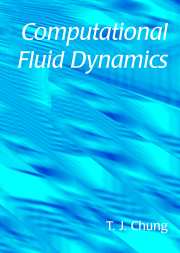Book contents
- Frontmatter
- Contents
- Preface
- PART ONE PRELIMINARIES
- PART TWO FINITE DIFFERENCE METHODS
- PART THREE FINITE ELEMENT METHODS
- PART FOUR FOUR. AUTOMATIC GRID GENERATION, ADAPTIVE METHODS, AND COMPUTING TECHNIQUES
- 17 Structured Grid Generation
- 18 Unstructured Grid Generation
- 19 Adaptive Methods
- 20 Computing Techniques
- PART FIVE APPLICATIONS
- APPENDIXES
- Index
19 - Adaptive Methods
Published online by Cambridge University Press: 15 January 2010
- Frontmatter
- Contents
- Preface
- PART ONE PRELIMINARIES
- PART TWO FINITE DIFFERENCE METHODS
- PART THREE FINITE ELEMENT METHODS
- PART FOUR FOUR. AUTOMATIC GRID GENERATION, ADAPTIVE METHODS, AND COMPUTING TECHNIQUES
- 17 Structured Grid Generation
- 18 Unstructured Grid Generation
- 19 Adaptive Methods
- 20 Computing Techniques
- PART FIVE APPLICATIONS
- APPENDIXES
- Index
Summary
The ultimate goal in computational fluid dynamics is to obtain desired solutions as accurately as possible while minimizing the requirement for computational resources. Thus, we ask: how do we achieve both “accuracy” and “efficiency”at the same time? Often we exercise a compromise where we may choose to sacrifice some accuracy for the sake of expediting a solution, or vice versa. Does an acceptable compromise exist? These are the types of questions that typically enter the minds of the CFD practitioner before undertaking a major project.
Given a fixed computational method and limited computer resources, one is confronted with a decision as to which direction to follow. The most feasible approach under these restricted circumstances will be to seek the best computational grid arrangement which will lend itself to the best possible accuracy and maximum efficiency. Adaptive methods are designed to achieve both accuracy and efficiency, with mesh refinements provided selectively only where needed.
The basic concept for adaptive methods consists of providing mesh refinements for efficiency (cost reduction) as dictated by predetermined criteria. The criteria for mesh refinements and unrefinements (coarsening) are determined by error indicators. The error indicators are usually represented by gradients of a suitable variable – the larger the gradient, the finer the mesh required.
In line with the two different grid generation schemes, structured and unstructured, two different adaptive methods are available, one for structured grids and another for unstructured grids. The structured adaptive methods are presented in Section 19.1, with the unstructured adaptive methods in Section 19.2.
STRUCTURED ADAPTIVE METHODS
Structured adaptive meshes may be constructed either by a control function approach or by a variational function approach. We shall discuss both of these methods next.
- Type
- Chapter
- Information
- Computational Fluid Dynamics , pp. 607 - 643Publisher: Cambridge University PressPrint publication year: 2002



